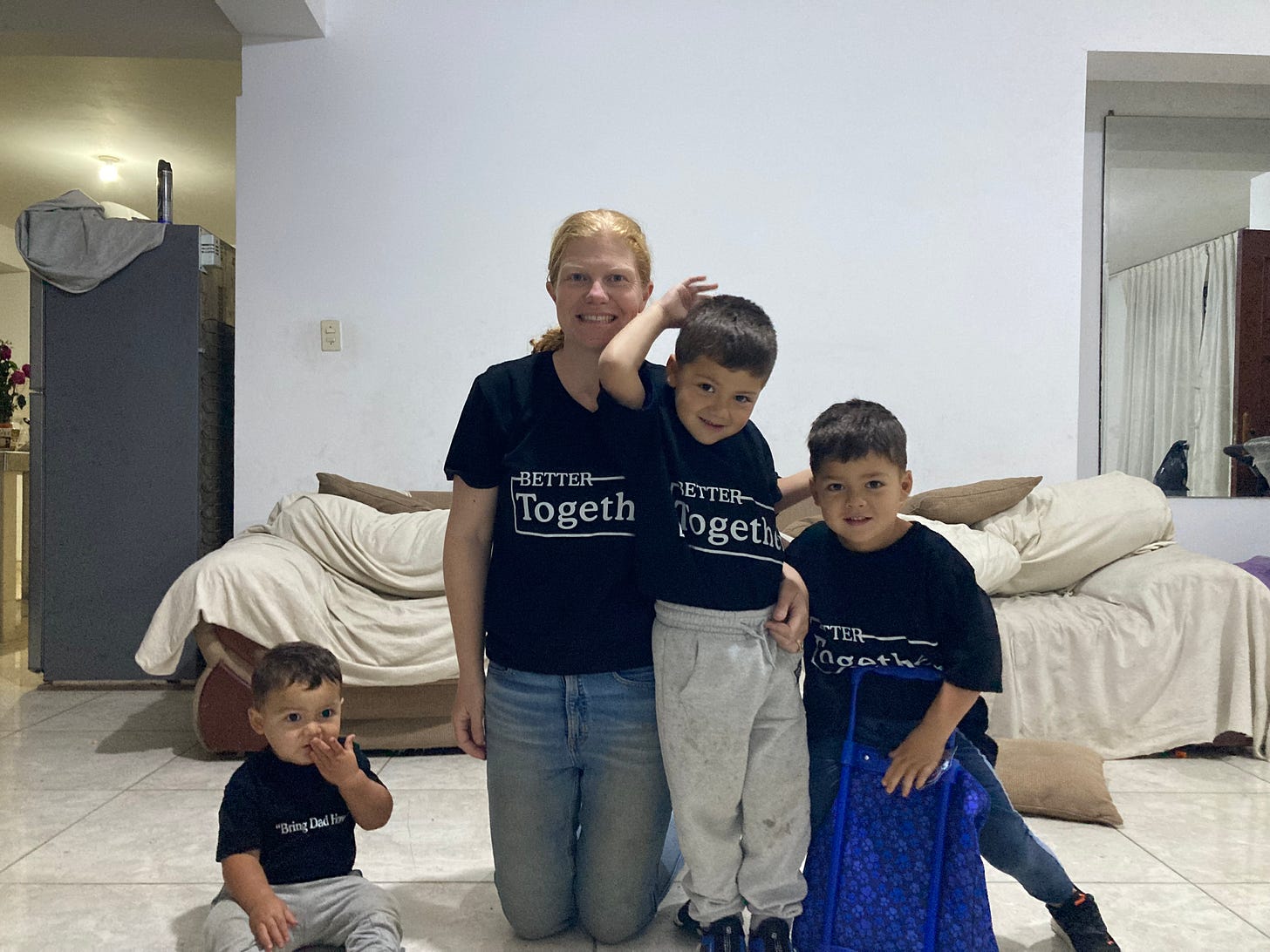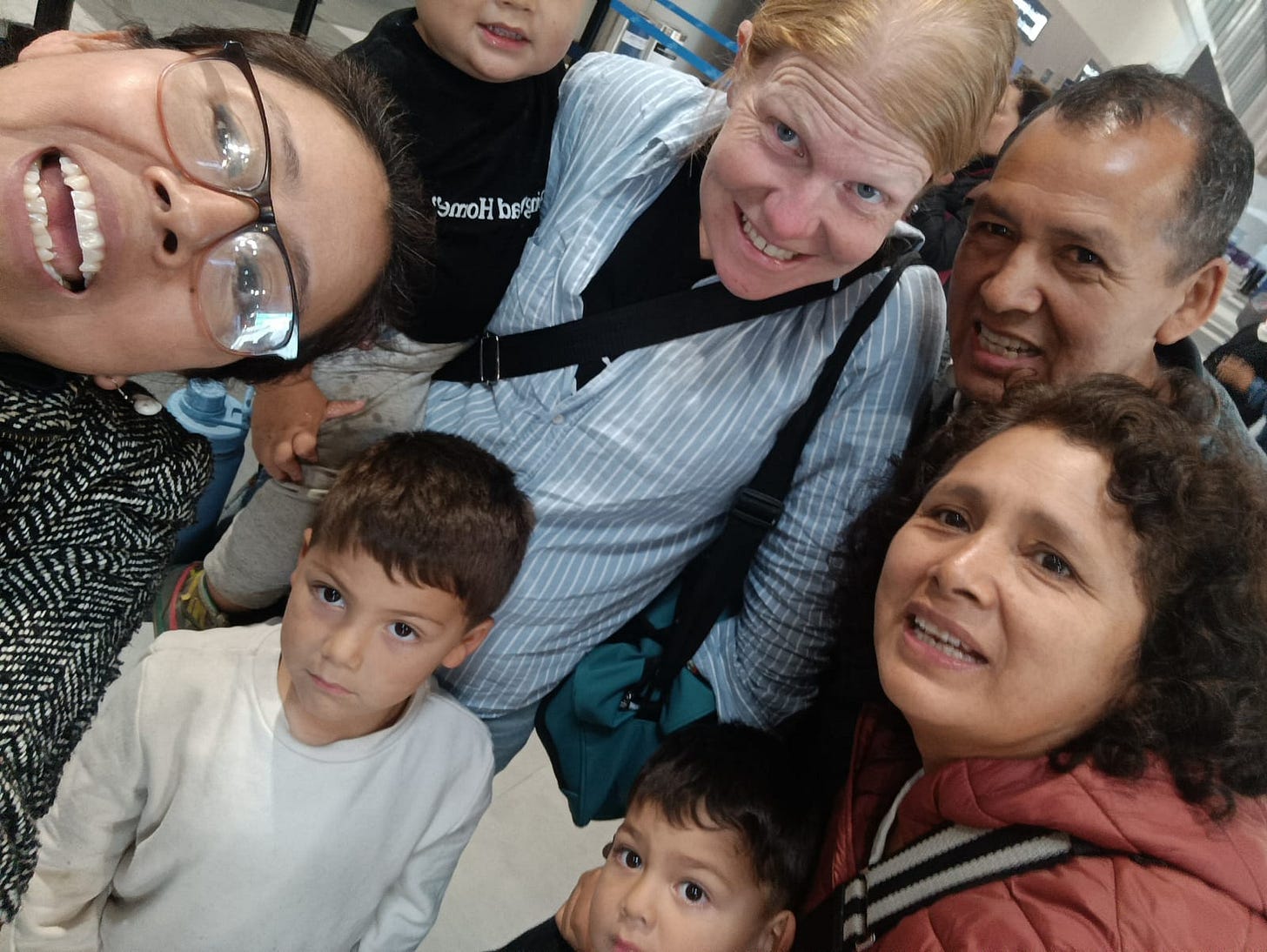Sharing and Strangers
no. 27
Lima opened a new airport. There were reports of a rough start—some kinks still not ironed out. As we crossed the bridge into the entrance, we saw murals painted along the sides. “Come back soon!” one sign read. For us, that will be true.
We had picked up Tía Trini on the way to the airport. When I hugged Tío Chachi goodbye at the door, he gave me three gold coins. Each one said “50 soles de oro.” One was for my mom, one for my dad, and I think the last was for safe travels. Leifer tells me these coins are from the 1980s and are collector’s items.
At the airport, Tía Julia was waiting for us. The lines were long. The check-in kiosk wasn’t working, so I had to get in line to wait for help. Under normal circumstances, this kind of delay would fill me with dread—but today, I would’ve been happy to miss the flight, as if the universe were conspiring to keep our family together.
I had shirts made. On the front: Better Together. On the back: Bring Leifer Home. We all wore them. The boys’ shirts said Bring Dad Home. I have to do something—anything—to try to bring Leifer back. Taking action gives me hope, and the hope helps me crowd out the dread. I had been anxious about traveling alone with three boys. “Look for the helpers,” my mom tells me.
At security, we took a quick photo together and then said a rushed goodbye to Leifer. My tears flowed. I wiped them away as quickly as they came, not wanting the boys to see. We walked through the metal detector—each of us setting it off. They frisked Leif, which seemed excessive for a five-year-old. They frisked me, too, even as I held Lucca in my arms. I was still crying. I must have looked guilty.
Next was immigration. The man helping us looked like he hadn’t slept in days. He pulled up my application—the one I had submitted weeks ago to change my Peruvian visa status. I wondered what would happen to it now that I was leaving Peru. His eyes closed for a moment. He had dozed off. Then he opened them, looked around to get his bearings, and resumed working slowly. Our flight had begun boarding. I wanted to scream at him to hurry. But I smiled instead, trying to keep my karma in balance. “Maybe he’s been working long shifts,” Leifer said. The airport felt disorganized. We were finally waved through—two days before our required departure date.
On the plane, we were seated in the last row. It turned out to be a blessing: close to the bathrooms and the flight attendants. Enzo popped up often for soda. One of the attendants had an 11-month-old son, and her husband was a professional soccer player in Juárez. We chatted a bit. She helped Enzo find Paw Patrol and started calling him her friend. I was happy he had a friend. Sometimes I want to give Enzo all my attention, but Lucca was asleep in my arms. The flight from Lima to L.A. was eight hours. The boys watched TV the whole time. I was so grateful they liked it. Eight hours is a long time to sit, but they were champs. After we landed, they ran and ran—laughing and playing. I was too tired to chase them, still carrying Lucca. Other travelers seemed entertained by them, so I stifled my urge to yell, even though I panicked whenever I lost sight of them. Our spirits were good. Enzo’s flight attendant friend had sent us off with a giant bag of candy.
After the flight, we went through immigration again. They separated us into two lines—one for U.S. citizens and one for Green Card holders. I couldn’t help but think about how we’ll be separated from Leifer again, once he has his papers. The Green Card line was much longer. I wanted to be angry at the officer who helped us, but he was so kind to my kids, who were bouncing around.
There was a man behind me in the security line in L.A. He told me he remembered traveling with his young kids—that it had been a long time ago. He saw our shirts and said he wished, for my sake, that Dad was with us too. We talked about the story behind our shirts. He shared that his brother had married a Peruvian woman—that’s who he was going to visit. “My brother is in hospice,” he told me. It reminded me that everyone is going through something. I was grateful we had shared pieces of our stories with each other.
When I was young, my dad went to Singapore for work. I remember it feeling like forever—though it was only three weeks. I remember a scorpion crawling up the wall in my brother’s room. My brother and I stood by, holding a shoe. Scorpions were Dad’s job. That might’ve been the last straw for my mom. I’m sure we handled it somehow, though I don’t remember how. My mom and I speak often of that trip, now that I am traveling back to California alone.
Back home, the crisp air danced through my nose. I wandered through the house barefoot, feeling the floors beneath me. The boys asked me to read to them before bed, but it was already past midnight.
“Tomorrow,” I told them, happy they remembered our nighttime reading rituals. “Mom, when can Dad come home?” Leif asked.
“Soon, I hope,” I said.
He had told his classmates that Dad was having trouble with his Green Card. Little by little, he understands. He has new fears now—of wolves, bears, and snakes, he tells me. I wonder if he feels more vulnerable without his dad. Maybe he talks about his fears with the only language he has. Or maybe he just feels something in his body and is trying to name it.
We sleep in the same room, just like we did in Peru. I used to want the boys to sleep independently when they were little. Now, I can’t imagine them being far from me.
Note: If you would like to have a Better Together, send me a note. I brought some home with us.
Thank you for all the letters, well wishes, and support you sent us before, during, and after our travels. I am hopeful, encouraged, and motivated by all of you.
If you are just recently joining me, consider starting at the beginning of this story here. Share my family’s story with others. Share your stories with me. We are better together.




Abby you all are in my prayers. I tear up reading your stories.
Welcome home. My heart goes out to you ❤️